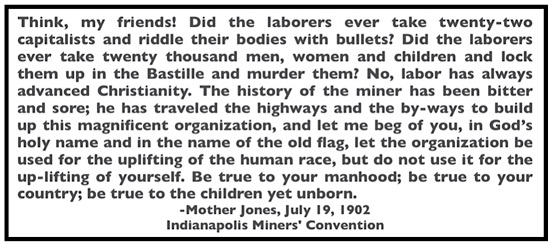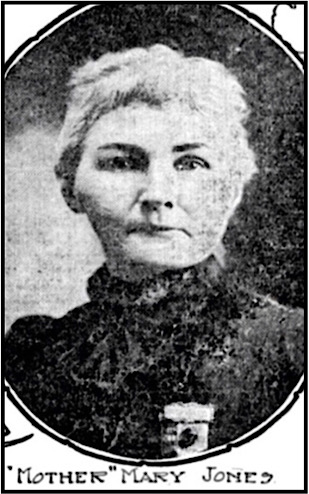 —————
—————
Hellraisers Journal – Monday July 21, 1902
Indianapolis, Indiana – Mother Jones Speaks to Miners’ Convention, Part II
From the Minutes of U. M. W. A. Special Convention, Called to Consider the Anthracite Strike, Indianapolis, Indiana, July 17-19, 1902:
Mother Jones Addresses Convention
Saturday Morning, July 19, 1902[Part II of II]
Let me warn you right here and now that any fellow who is not willing to go up against all these forces [company gunthugs, injunctions, U. S. Marshals, courts and jails] had better stay out of West Virginia; don’t go over there, for we don’t want you unless you are willing. We want fighters, although we are conducting our business on peaceful lines and according to the Constitution of the United States.
I have wondered many times recently what Patrick Henry would say, Patrick Henry who said, “Give me liberty or give me death,” and who also said, “Eternal vigilance is the price of liberty,” if he could witness the things that are done in West Virginia in this day and age, in a state that is supposed to be under the Constitution of the United States? I say with him, “Give me liberty or give me death, for for liberty I shall die, even if they riddle my body with bullets after I am dead.”
My friends, you must emancipate the miners of West Virginia; they should be the barometer for you in the future. You have a task; go bravely home and take it up like men. Each one of you should constitute himself a missionary, each one should do his duty as a miner and as a member of this organization. Do your duty also as citizens of the United States, do your duty as men who feel a responsibility upon you, and remember, friends, that it is better to die an uncrowned free man than a crowned slave. You and I must protest against this injustice to the American people that we are suffering under in West Virginia and in Pennsylvania, and in other fields.
In West Virginia the attorney for the company in his argument said, when my case was up, “In strikes of the past we got the deputies, the marshals and the Federal troops out, and still the strikers won the strikes; but the moment the court came out with an injunction, then the strikers were whipped.” He said further that the injunction was the barricade behind which the operators can stand.
There is an acknowledgement that we have no show; that the injunction is used for the benefit of the ruling classes. Now remember when your candidates get up and tell you what good friends they are to the laboring class, you ask them to sit right down and take an oath that the first thing they will do when they get to Congress is to introduce a bill entitled, “No government by injunction.”
Now I want to say a word about the West Virginia comrades. A great deal has been said for and against them. Perhaps no one there knows them better than I do. No one has mingled with them more than I have, and no one has heard more of their tales of sorrow and their tales of hope. I have sat with them on the sides of the mountains and the banks of the rivers and listened to their tales.
One night a comrade from Illinois [John H. Walker] was going with me up the mountain side. I said, “John, I believe it is going to be very dark tonight,” and he said he thought it was, for only the stars were shining to guide us. When we got to the top of the mountain, besides the stars in the sky we saw other little stars, the miners’ lamps, coming from all sides of the mountains. The miners were coming there to attend a meeting in a schoolhouse where we had promised to meet them, and I said to John, “There comes the star of hope, the star of the future, the star that the astronomer will tell nothing about in his great works for the future ages; but that is the star that is lighting up the ages yet to come; there is the star of the true miner laying the foundation for a higher civilization, and that star will shine when all other stars will grow dim.”
We held a meeting there that night, and a braver band does not live on the face of this earth today than that band of men up there on the mountain top that night. And in their behalf I stand pleading with you here today. They have their faults, I admit, but no state ever produced nobler, truer, better men under the appalling circumstances and conditions under which they work. It matters not whether a miner is robbed in Illinois or in Virginia, in Indiana or in the anthracite region; they are all ours, and we must fight the battle for all of them. I think we will come out victorious in this fight, but it will only be for a while. Both sides will line up for the final conflict, and you must be ready for the fray. We have no time to lose.
There is a peaceful method for settling this conflict. Get books; read at home; read to each other; take your boys that go to school and sit down and discuss the labor problem with them. Teach your women and children to not buy anything that has not a Union label on it, to buy nothing that is not made by Union men with Union principles. You will in that way soon drive scabs and blacklegs out of the market; there will be no room for them.
All of us should do our duty in this matter. Go home from this convention and put every dollar you can spare above your living expenses into this fight. If it costs us every penny we have, if we have to sell our clothes to get money to put into this fight we should do it. We have a class in the two Virginias—and they are the only two states in the Union, perhaps, where you can find them—that do not know what freedom means. They are a species of the human race that for ages have been slaves. They have come down from the feudal days, they have never known what freedom was; they were sent out here in the time of George III in order to defeat the Colonists who were fighting for the freedom of their country. There are still remnants of them in the two Virginias, and they will work for twenty-five cents a day and be satisfied with it if their masters will give them no more. But they are in the minority. Think of the New River field, of the Kanawha River, of Loop Creek, and think of the work the boys have done there. Every wheel there is closed down, and that shows to you what good material there is there.
One of the best elements there, I am here to tell you, are the colored men. One of the best fellows we have is the black man. He knows what liberty is; he knows that in days gone by the bloodhounds went after his father over the mountains and tore him to pieces, and he knows that his own Mammy wept and prayed for liberty. For these reasons he prizes his liberty and is ready to fight for it. My friends, the most of us have been told that we have liberty, and we believed the people who told us that!
Now, my friends, we should all work together in harmony to secure our rights. Don’t find fault with each other; rather clasp hands and fight the battle together. Be true to the teachings of your forefathers who fought and bled and raised the old flag that we might always shout for liberty. Think, my friends! Did the laborers ever take twenty-two capitalists and riddle their bodies with bullets? Did the laborers ever take twenty thousand men, women and children and lock them up in the Bastille and murder them? No, labor has always advanced Christianity. The history of the miner has been bitter and sore; he has traveled the highways and the by-ways to build up this magnificent organization, and let me beg of you, in God’s holy name and in the name of the old flag, let the organization be used for the uplifting of the human race, but do not use it for the up- lifting of yourself. Be true to your manhood; be true to your country; be true to the children yet unborn.
Now I want to say to you here that whether I die in jail or outside, I want to feel in the closing hours of my life that you have been true to each other, that you have been true to the principles of our forefathers. If you are true to these things the battle will end in victory for you.
[Photograph, paragraph breaks and emphasis added.]
~~~~~~~~~~~~~~~~~~~~~~~~~
SOURCES
Minutes of United Mine Workers of America
Special Convention, Called to Consider the Anthracite Strike
Indianapolis, Indiana, July 19, 1902
https://cuomeka.wrlc.org/exhibits/show/mother-jones/item/860
https://cuomeka.wrlc.org/files/original/e8a127cff2e927a72bf17df6f97c6617.pdf
IMAGE
Mother Jones , Phl Inq p24, June 22, 1902
https://www.newspapers.com/image/168338244/
See also:
Minutes of United Mine Workers of America
Special Convention, Called to Consider the Anthracite Strike
Indianapolis, Indiana, July 17-19, 1902
https://catalog.hathitrust.org/Record/100879249
The Speeches and Writings of Mother Jones
-ed by Edward M. Steel
University of Pittsburgh Press, 1988
https://books.google.com/books?id=vI-xAAAAIAAJ
https://digital.library.pitt.edu/islandora/object/pitt%3A31735035254105/viewer#page/1/mode/2up
Steel Speeches p15-21 (38 of 360)
https://digital.library.pitt.edu/islandora/object/pitt%3A31735035254105/viewer#page/38/mode/2up
Tag: Great Anthracite Coal Strike of 1902
https://weneverforget.org/tag/great-anthracite-coal-strike-of-1902/
Tag: West Virginia Coalfield Strike of 1902-1903
https://weneverforget.org/tag/west-virginia-coalfield-strike-of-1902-1903/
~~~~~~~~~~~~~~~~~~~~~~~~~
They’ll Never Keep Us Down – Hazel Dickens

